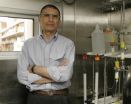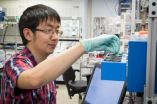(Press-News.org) Scientists can now explain a third of the inherited risk of prostate cancer, after a major international study identified 23 new genetic variants associated with increased risk of the disease.
The study brings the total number of common genetic variants linked to prostate cancer to 100, and testing for them can identify 1% of men with a risk of the disease almost six times as high as the population average.
Scientists at The Institute of Cancer Research, London, and in Cambridge, UK, and California led a huge search for new genetic variants including almost 90,000 men and for the first time combining populations with European, African, Japanese and Latino ancestry.
The research, published today (Sunday) in Nature Genetics, was funded in equal amounts by Cancer Research UK, Prostate Cancer UK, the EU and the National Institutes for Health in the US.
Researchers found that assessing the top 100 variants identified 10% of men with a risk almost three times as high as the population average, and said that this was high enough to investigate whether targeted genetic screening was merited. They plan to lead a new clinical trial to test whether genetic screening can be effective.
In European men, scientists had previously found 77 genetic variants which were known to increase the risk of prostate cancer.
In the new research, scientists from The Institute of Cancer Research (ICR), University of Cambridge and the University of Southern California in the US examined the genetic information of 87,040 men from all over the world.
They combined genetic population studies of 43,303 men with prostate cancer and 43,737 controls from European, African, Japanese or Latino heritage to improve statistical power and increase their chances of identifying new variants.
From this combined population, they identified 16 new genetic markers linked to prostate cancer risk in European men - one of them associated with increased risk of early-onset disease - and seven in men of mixed heritage.
The study means that scientists can now explain 33% of the inherited origins of prostate cancer in European men. A new clinical trial called BARCODE, which aims to genetically screen 5,000 men for prostate cancer, will investigate if these genetic markers can improve on other tests for the disease.
They are investigating whether genetic testing could help diagnose more men at risk of developing dangerous forms of prostate cancer that need urgent treatment – something that the current PSA test is unable to tell us.
The new study shows that for European men assessed for the 100 common variants, the 10% at highest risk are 2.9 times more likely than the average person to develop prostate cancer, while the top 1% are 5.7 times more likely to develop the disease.
Professor Ros Eeles, Professor of Oncogenetics at The Institute of Cancer Research, London, and Honorary Consultant in Clinical Oncology at The Royal Marsden NHS Foundation Trust, said: "Our study tells us more about the effect of the genetic hand that men are dealt on their risk of prostate cancer. We know that there are a few major genes that are rare and significantly affect prostate cancer risk, but what we are now learning is that there are many other common genetic variants that individually have only a small effect on risk, but collectively can be very important. To use the playing cards analogy again, sometimes multiple low cards can combine to form a high risk score.
"We can now explain a third of the inherited risk of prostate cancer, and will shortly be conducting a clinical trial to find out whether testing for genetic variants in men can successfully pick up the disease early, and help direct targeted interventions for patients."
Professor Malcolm Mason, prostate cancer expert for Cancer Research UK, said: "This important research continues a quest to unravel the complex picture of the genetic factors that increase a man's risk of prostate cancer.
"Building on previous research this study gives a more complete list of these factors, bringing us closer to knowing who may need screening for prostate cancer and which men may benefit from early treatment. More work needs to be done, but identifying these genetic factors will allow us to better understand the disease and maybe even develop new treatments."
Dr Matthew Hobbs, Deputy Director of Research at Prostate Cancer UK said: "There's no doubt that genetic testing for prostate cancer is an exciting area of research. The results of this study could take us a step closer to targeted screening by allowing us to identify those most at risk of the disease based on the genes that they possess. However, this is not the end of the story and the challenge now lies in translating this knowledge into a reliable test that can be used on a large scale through the NHS to find those men at highest risk.
"It is also absolutely vital that researchers build on this work to discover which of these genetic variants can tell us whether a man's cancer is aggressive and likely to go on to kill him, or one that may never cause any harm. This would save those men with non-aggressive disease from undergoing unnecessary treatment."
INFORMATION: END
Genetic testing can identify men at 6-fold increased risk of prostate cancer
Scientists can now explain one-third of the inherited risk of prostate cancer, after a major international study identified 23 new genetic variants associated with increased risk of the disease
2014-09-15
ELSE PRESS RELEASES FROM THIS DATE:
Rules of thumb for climate change turned upside down
2014-09-15
Based on models and observations, climate scientists have devised a simplified formula to describe one of the consequences of climate change: regions already marked by droughts will continue to dry out in the future climate. Regions that already have a moist climate will experience additional rainfall. In short: dry gets drier; wet gets wetter (DDWW).
However, this formula is less universally valid than previously assumed. This was demonstrated by a team of ETH climate researchers led by Peter Greve, lead author of a study recently published in Nature Geoscience. Traditional ...
Measuring modified protein structures
2014-09-15
Cells regulate protein functions in a wide variety of ways, including by modifying the protein structure. In an instant, a protein can take on another form and perform no or even the "wrong" function: in humans, proteins that fold wrongly can cause serious diseases such as Alzheimer's, Parkinson's or cystic fibrosis. Some of these proteins also have a tendency to "infect" other molecules of the same type and congregate into insoluble so-called amyloid fibrils or plaques. These amyloids can damage cells and tissues and make people ill.
Method breaks the shackles
Until ...
UNC researchers find final pieces to the circadian clock puzzle
2014-09-15
CHAPEL HILL, NC – Researchers at the UNC School of Medicine have discovered how two genes – Period and Cryptochrome – keep the circadian clocks in all human cells in time and in proper rhythm with the 24-hour day, as well as the seasons. The finding, published today in the journal Genes and Development, has implications for the development of drugs for various diseases such as cancers and diabetes, as well as conditions such as metabolic syndrome, insomnia, seasonal affective disorder, obesity, and even jetlag.
"Discovering how these circadian clock genes interact has ...
Cheaper alternative to licensed drug for treating eye disease has similar side-effects
2014-09-15
Health policies which favour using ranibizumab for treating eye disease in older people over safety concerns for a cheaper alternative should take account of a new Cochrane Review published today. The researchers looked at the results of studies which compared the safety of two drugs used for treating age-related macular degeneration, ranibizumab and bevacizumab. Contrary to what was argued by some experts the review has found that the cheaper drug, bevacizumab, does not appear to increase deaths or serious side-effects compared with ranibizumab in people with neovascular ...
Study sheds new light on why batteries go bad
2014-09-15
Menlo Park, Calif. — A comprehensive look at how tiny particles in a lithium ion battery electrode behave shows that rapid-charging the battery and using it to do high-power, rapidly draining work may not be as damaging as researchers had thought – and that the benefits of slow draining and charging may have been overestimated.
The results challenge the prevailing view that "supercharging" batteries is always harder on battery electrodes than charging at slower rates, according to researchers from Stanford University and the Stanford Institute for Materials & Energy Sciences ...
Marijuana users who feel low get high
2014-09-15
PISCATAWAY, NJ – Adolescents and young adults who smoke marijuana frequently may attempt to manage negative moods by using the drug, according to a study in September's Journal of Studies on Alcohol and Drugs.
"Young people who use marijuana frequently experience an increase in negative affect in the 24 hours leading up to a use event, which lends strong support to an affect-regulation model in this population," says the study's lead author Lydia A. Shrier, M.D., M.P.H., of the division of adolescent and young adult medicine at Boston Children's Hospital.
She notes ...
Hypersensitivity to non-painful events may be part of pathology in fibromyalgia
2014-09-15
New research shows that patients with fibromyalgia have hypersensitivity to non-painful events based on images of the patients' brains, which show reduced activation in primary sensory regions and increased activation in sensory integration areas. Findings published in Arthritis & Rheumatology, a journal of the American College of Rheumatology (ACR), suggest that brain abnormalities in response to non-painful sensory stimulation may cause the increased unpleasantness that patients experience in response to daily visual, auditory and tactile stimulation.
Fibromyalgia ...
New knowledge of genes driving bladder cancer points to targeted treatments
2014-09-15
The story of cancer care seems so simple: find the mutated gene that causes cancer and turn it off or fix it. But rarely does a single gene cause cancer. More often, many genes are altered together to drive the disease. So the challenge becomes sorting out which altered genes are the most to blame in which cancers. A collaborative study between researchers at the University of Colorado Cancer Center and the National Cancer Institute (NCI) published today in the journal Clinical Cancer Research takes an important step toward answering this question in bladder cancer.
Specifically, ...
Identifying a better message strategy for dissuading smokers: Add the positive
2014-09-15
WASHINGTON — Which is more likely to convince a smoker to quit? The words, "Warning: cigarettes cause cancer" beneath the image of an open mouth with a cancerous lesion and rotten teeth, or the same image with the words, "Warning: Quitting smoking reduces the risk of cancer"?
The answer depends on how confident you are in your ability to quit, according to a study led by researchers at Georgetown Lombardi Comprehensive Cancer Center and published in the journal Nicotine & Tobacco Research.
The research, which involved 740 participants and three D.C. area institutions, ...
To curb violent tendencies, start young
2014-09-15
DURHAM, N.C. -- Aggressive children are less likely to become violent criminals or psychiatrically troubled adults if they receive early intervention, says a new study based on more than two decades of research.
These findings from researchers at Duke, Pennsylvania State and Vanderbilt universities and the University of Washington are based on the Fast Track Project, a multi-faceted program that is one of the largest violence-prevention trials ever funded by the federal government.
Beginning in 1991, the researchers screened nearly 10,000 5-year-old children in Durham, ...
LAST 30 PRESS RELEASES:
Study finds early imaging after pediatric UTIs may do more harm than good
UC San Diego Health joins national research for maternal-fetal care
New biomarker predicts chemotherapy response in triple-negative breast cancer
Treatment algorithms featured in Brain Trauma Foundation’s update of guidelines for care of patients with penetrating traumatic brain injury
Over 40% of musicians experience tinnitus; hearing loss and hyperacusis also significantly elevated
Artificial intelligence predicts colorectal cancer risk in ulcerative colitis patients
Mayo Clinic installs first magnetic nanoparticle hyperthermia system for cancer research in the US
Calibr-Skaggs and Kainomyx launch collaboration to pioneer novel malaria treatments
JAX-NYSCF Collaborative and GSK announce collaboration to advance translational models for neurodegenerative disease research
Classifying pediatric brain tumors by liquid biopsy using artificial intelligence
Insilico Medicine initiates AI driven collaboration with leading global cancer center to identify novel targets for gastroesophageal cancers
Immunotherapy plus chemotherapy before surgery shows promise for pancreatic cancer
A “smart fluid” you can reconfigure with temperature
New research suggests myopia is driven by how we use our eyes indoors
Scientists develop first-of-its-kind antibody to block Epstein Barr virus
With the right prompts, AI chatbots analyze big data accurately
Leisure-time physical activity and cancer mortality among cancer survivors
Chronic kidney disease severity and risk of cognitive impairment
Research highlights from the first Multidisciplinary Radiopharmaceutical Therapy Symposium
New guidelines from NCCN detail fundamental differences in cancer in children compared to adults
Four NYU faculty win Sloan Foundation research fellowships
Personal perception of body movement changes when using robotic prosthetics
Study shows brain responses to wildlife images can forecast online engagement — and could help conservation messaging
Extreme heat and drought at flowering could put future wheat harvests at risk
Harlequin ichthyosis: a comprehensive review of pathogenesis, diagnosis, and management
Smithsonian planetary scientists discover recent tectonic activity on the Moon
Government censorship of Chinese chatbots
Incorporating a robotic leg into one’s body image
Brain imaging reveals how wildlife photos open donor wallets
Wiley to expand Advanced Portfolio
[Press-News.org] Genetic testing can identify men at 6-fold increased risk of prostate cancerScientists can now explain one-third of the inherited risk of prostate cancer, after a major international study identified 23 new genetic variants associated with increased risk of the disease



